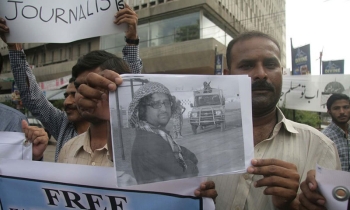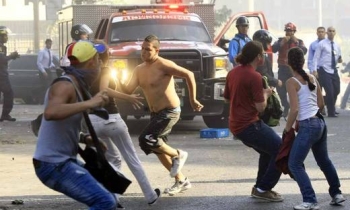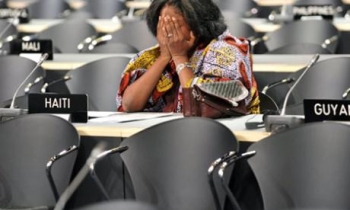Efforts to win the release of the kidnapped BBC journalist Alan Johnston were set back last night when the militants holding him threatened to kill him and said he would not be freed until their demands were met.
The warning, from a spokesman for a group calling itself the Army of Islam, came on a day when Hamas officials had suggested Johnston's release was only hours away.
"Freeing this detainee has not been part of any deal with any faction or organisation. What appears on television screens and through the media here and there are untrue," the Army of Islam spokesman, named as Abu Khatab, told al-Jazeera television last night.
"If they do not meet our demands there will be no release for that detainee and if things become more difficult ... then we would seek God's satisfaction by slaughtering this journalist."
Johnston, 45, was seized on March 12 as he drove from the BBC office in Gaza City the short distance to his apartment. A video showing him was released earlier this month by the group, which demanded the release of a radical cleric held in jail in Britain. It is understood to be led by a member of the Dogmush clan, a large criminal family based in the Sabra district of Gaza City.
Earlier, Hamas officials had suggested Johnston's release could be imminent; one representative said yesterday he would be freed "within the next hours, today". The BBC in London said it had not received any "firm confirmation" of Johnston's situation.
Hamas is keen to secure Johnston's release because of its promise to get tough on corruption and criminality in Gaza. Before it seized control of Gaza last Thursday, after months of factional fighting with their rivals from the Fatah movement, the negotiations for the release of the journalist were mostly conducted by the Palestinian Authority's intelligence forces, a Fatah organisation. Some of the intelligence officers, who have now fled from Gaza to the West Bank, said the Hamas takeover might make it harder to win his release.
But Hamas has said one of its priorities in Gaza is to establish security after months of lawlessness and feuding. It is a goal Hamas regards as important to maintain its credibility among Gazans after so much fighting and one of the first Hamas actions since the takeover was to crack down on some of the powerful, armed clans which make their money smuggling weapons and other contraband.
On Saturday, Hamas stormed houses belonging to the Astal clan in Khan Younis, a town in the southern Gaza strip. The clan had refused to give up its weapons. Hamas forces said they found weapons and drugs in the raid. Eight people were injured. "The point is to collect all illegal weapons from all families," said Islam Shahwan, a Hamas militia spokesman.
During the fighting last week, Hamas secured the effective surrender of several hundred members of another heavily armed family, the pro-Fatah Bakr clan. But the Dogmush present a bigger challenge. The clan is split into different factions which, over recent years have allied with Fatah, Hamas and the Popular Resistance Committees. The clan, particularly the Army of Islam, was one of the groups behind the capture a year ago of the Israeli soldier, Corporal Gilad Shalit, who remains in captivity. But in December two clan members were shot dead by Hamas fighters. Since then, the Dogmush, with up to 2,000 armed men, have been feuding with the Islamist group.
Most Palestinian officials believe Johnston was seized not because of some radical agenda, but to exert leverage on the then Hamas-led government. That his capture came amid the rapid and violent descent into anarchy in Gaza only made it more difficult to negotiate his release.
Nevertheless in an interview with the French newspaper Le Figaro published on Saturday, Ismail Haniyeh, a Hamas leader and recently sacked prime minister, tried to sound confident over securing Johnston's release ."There will be one sole legitimate force. We will install law and order in Gaza. Thus it will be easier to obtain the release of the British journalist Alan Johnston," he said.









